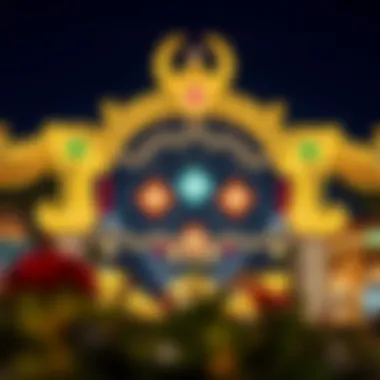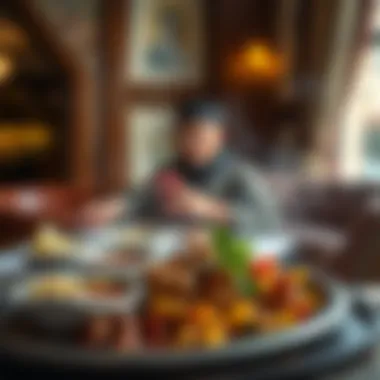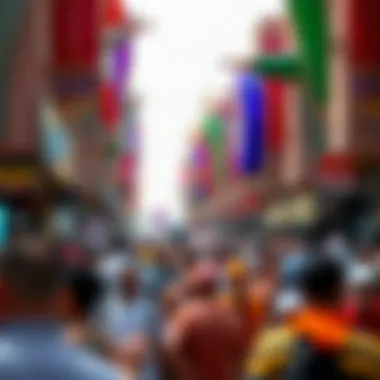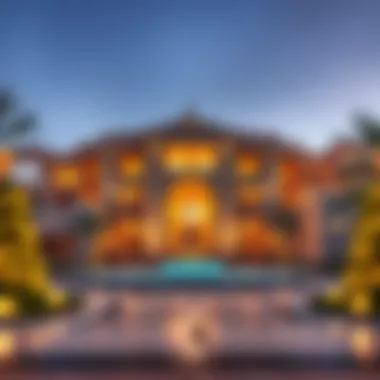Eid Holiday Celebrations in the UAE: A 2023 Perspective


Intro
Eid holidays in the UAE represent more than just a break from routine; they weave together a tapestry of cultural esteem, community bonding, and even economic growth. Having deep roots in the Islamic tradition, Eid al-Fitr marks the end of fasting during Ramadan, while Eid al-Adha celebrates the willingness of Ibrahim to sacrifice for God. Thus, 2023's Eid embodies not just religious significance but also a rich avenue for social and economic arrangements.
As the UAE approaches these holidays, an increasing number of local communities and international tourists prepare for the festivities. The unique blend of traditions showcases the diversity of the UAE, offering a unique opportunity to observe various cultural expressions and social interactions. This article will unfold the different facets of Eid celebrations, along with a focus on emerging trends, particularly in the realms of tourism and real estate. By highlighting these, we aim to provide investors and residents alike with an understanding of how the Eid spirit can materially impact the urban landscape and economic activities.
When looking ahead to the upcoming festive period, it is vital to explore how the current market trends intersect with the unique cultural practices of the UAE. With a keen eye on both short-term and long-term implications, this narrative underscores the interplay between festive occasions and the dynamics of property investments within the region.
Understanding Eid in the UAE
Understanding Eid in the UAE is pivotal for grasping the cultural framework surrounding this significant holiday. This festive period encapsulates not only the religious undertones but also the social fabric of Emirati society. By exploring the various dimensions of Eid, one can gain insight into how these celebrations shape community bonds, influence local economies, and attract global interest, especially for investors in various sectors.
The importance of understanding Eid extends beyond its mere observance; it reflects the values of generosity, family, and community. As these elements unify people, they also pave the way for economic engagement through tourism and commerce, linking the religious practices with day-to-day practices of life in the UAE.
Historical Context of Eid
Eid celebrations trace back centuries, with roots intertwined in Islamic tradition. Eid al-Fitr, marking the end of Ramadan, has its origins in the prophetic traditions of giving thanks for the strength shown during fasting. Over time, these festivities have evolved, incorporating local customs and regional nuances that define how Eid is celebrated today in the UAE.
For example, a notable practice is the communal prayer held at mosques or open areas, which emphasizes togetherness. The first Eid prayer holds historical significance, seen as an opportunity for the community to come together to express gratitude and seek blessings for the year ahead.
The evolution of Eid also mirrors the UAE's rapid modernization. While many traditions still hold firm, there's a blend of contemporary practices that reflect a globalized outlook. This mixed heritage creates a unique festive atmosphere, where traditional food meets modern culinary influences.
Cultural Significance of Eid Celebrations
Eid celebrations in the UAE transcend the religious aspect, embodying a rich cultural significance that resonates throughout society. This holiday serves as a vital time for reinforcing familial ties, intergenerational connections, and community solidarity.
From the hustle and bustle of bazaars where local artisans showcase handicrafts to family gatherings around traditional dishes like harees and kebsa, Eid presents a platform for cultural expression. It encourages the sharing of lavish meals, where hospitality is expressed through generosity and openness.
Charitable acts during Eid, such as giving Zakat al-Fitr, emphasize the spirit of giving and community support. This practice is not merely a religious obligation but is also a reaffirmation of the UAE's commitment to social welfare and cohesion. People come together, sharing resources and supporting those less fortunate, thus cementing a sense of unity.
Moreover, events such as fireworks displays and cultural festivals enrich the celebrations, drawing both locals and tourists alike. These activities showcase Emirati heritage, adding layers to the festive experience while promoting cultural understanding both locally and globally.
"Celebrations like Eid not only signify religious observance but are also pivotal in sustaining cultural identity and fostering community ties."
In summary, the understanding of Eid in the UAE is a dynamic narrative that incorporates historical depth, cultural heritage, and social commitment, making it a cornerstone of Emirati life and an invaluable aspect to consider for those interested in the region, whether they are investors, real estate professionals, or cultural enthusiasts.
Eid Holiday Timeline for
Understanding the timeline for Eid celebrations is crucial, especially for a multifaceted region like the UAE, where the festive atmosphere blends cultural practices and economic activities. Knowing the dates for Eid al-Fitr, for example, allows families, businesses, and government entities to prepare accordingly, ensuring the holiday's observance is both synchronized and festive.
This section delves into the anticipated timeline for 2023, intertwining the significance of these dates amidst a backdrop of both celebration and economic rejuvenation.
Expected Dates for Eid al-Fitr
Eid al-Fitr is traditionally celebrated at the conclusion of Ramadan, the holy month of fasting for Muslims. In 2023, the anticipated dates for Eid al-Fitr are likely to fall between April 21 and April 23, depending on the lunar calendar and moon sighting. The exact date is confirmed with the sighting of the crescent moon, leading to anticipation and excitement in communities.
This celebration could unfold as the end of a month-long spiritual journey, marking not just a return to regular dietary habits but a time for giving thanks and community gatherings.
The significance of accurately identifying Eid dates cannot be overstated, as it affects everything from family gatherings to retail sales and tourism flows in the UAE.


Significance of Moon Sighting
The process of moon sighting holds immense cultural and religious significance for the Muslim community, particularly in the UAE. This tradition is not merely about determining the start of Eid; it symbolizes a deep-rooted connection to Islamic values and community cohesion.
The anticipation builds as communities across the UAE gather for this time-honored practice. Families often head out together, armed with telescopes and binoculars, hoping to catch the first glimpse of the crescent moon. This communal aspect fosters camaraderie, and it reinforces the spirit of togetherness that Eid embodies.
The outcome of the moon sighting can also have significant implications for travel and tourism, especially in a country known for hosting a multitude of visitors during the Eid holidays. Knowing whether Eid will fall on a Friday or Saturday could influence the influx of tourists into the UAE, impacting local businesses and the economy.
Festive Traditions in the UAE
In the context of Eid celebrations, the UAE stands out with a tapestry of vibrant traditions. These practices embody not just the religious significance of Eid but also the cultural fabric of this diverse nation. The essence of these traditions enhances community bonds, giving insight into the collective values of sharing, compassion, and unity that the holiday celebrates.
Family Gatherings and Feasting
Family remains at the heart of Eid, where the focal point is often a grand feast. Gathering around a table, families come together to share not only food but stories and laughter, deepening familial ties. Traditional dishes take center stage, with meals prepared with love, sometimes following recipes passed down through generations.
The aroma of biryani, layers of saffron-flavored rice and tender meat, mingles with the sweet scent of baklava, filled with nuts and drizzled in honey. It’s a feast where no one goes hungry, emphasizing generosity and hospitality.
In many households, especially in larger Emirati families, it’s not unusual to see tables laden with food, each dish representing a piece of their heritage. Guests are welcomed with open arms, as it is customary to extend invites to neighbors and friends, reinforcing community ties. The act of sharing food during Eid not only fosters togetherness but also reminds everyone of the blessings they have.
Charitable Acts During Eid
Eid is not just about feasting; it's a time for giving and reflection. During this holiday, Zakat al-Fitr, a form of charity, holds significant importance. This obligation is meant to purify those who fast during Ramadan and serves as a means for Muslims to help those less fortunate, ensuring they can partake in the Eid festivities without concern.
Many people make it a priority to donate before the Eid prayers, which helps those in need to enjoy the holiday. This spirit of giving, deeply embedded within the community, underscores the values of empathy and responsibility toward others.
Every act of charity, whether big or small, is warmly acknowledged within the society. Families often organize food drives or collect clothes to distribute to those less privileged. This not only addresses immediate needs but also fosters a sense of solidarity within the community. Through charitable actions, Eid transcends being merely a festive occasion, evolving instead into a powerful reminder of social responsibility.
Community Celebrations and Festivities
Public celebrations during Eid in the UAE are nothing short of spectacular. Streets are adorned with lights, and events are organized to bring communities together. Each emirate has its own unique flavor when it comes to celebration, from fairs featuring traditional music and dance to stunning firework displays lighting up the night sky.
Dubai's Global Village often hosts an array of cultural shows, inviting people to experience a blend of customs from various backgrounds. Cultural festivals reflect the UAE’s diversity, making it possible for locals and tourists alike to immerse themselves in the rich heritage of their neighbors.
During Eid, parks and open spaces come alive with families enjoying picnics, activities for kids, and live entertainment. This joyful atmosphere creates a sense of belonging and unity among participants. The celebrations often linger well into the evening, with vendors contributing to an exciting ambiance, selling everything from traditional sweets to festive decorations.
"Eid is a reminder that beyond our individual differences, there exists a shared commitment to humanity.”
In summary, the festive traditions during Eid in the UAE encapsulate an intricate mix of religious devotion and cultural richness. From intimate family gatherings to community celebrations, these activities provide deeper insights into the essence of the holiday. The significance of charitable acts further enhances the spirit of Eid, emphasizing humanity, kindness, and unity.
Impact on Tourism
The significance of tourism during Eid holidays in the UAE cannot be overstated. This festive period attracts a large number of visitors, both local and international. It serves as an essential aspect of the economic framework, providing numerous benefits and opportunities to various sectors. The influx of tourists not only brings life to cities but also enhances cultural exchanges and diversifies the economy further.
Increased Visitor Footfall
During Eid, the UAE observes a remarkable surge in visitor numbers. This increase can be attributed to various factors. First off, many people perceive Eid as a culturally rich time to experience the traditions and festivities in the UAE. The spectacle of firework shows, decorative lights adorning the roads, and vibrant markets contribute to the allure of the destination.
Furthermore, holiday promotions from airlines and hotels often lure holidaymakers. Special packages during this time make it easier for families to plan vacations, leading to a notable rise in bookings for both leisure and business trips. For instance, luxury hotels often offer elaborate Eid brunches and exclusive deals on family stays, making them an attractive option for both residents and tourists.


"With a noticeable increase in footfall, participating businesses look forward to a boost in annual revenue during Eid."
Several events such as cultural festivals and exhibitions are held to showcase Emirati traditions. These events not only entice tourists but also foster a sense of pride among locals and immigrants about the UAE's rich heritage. For real estate agents and property developers, increased tourism means higher demands for temporary accommodation options, further stimulating the market.
Cultural Tours and Experiences
Cultural tours and unique experiences have become vital elements of tourism during Eid. Various organizations and guide companies tailor their offerings to enhance the festive experience for visitors. Tourists have the chance to witness traditional practices, ranging from the preparation of special dishes to the performance of cultural dances, providing an invaluable insight into Emirati culture.
One prime example is the guided tours that take visitors through historical sites like Al Fahidi Fort and the Sheikh Mohammed Centre for Cultural Understanding. These tours often emphasize the cultural significance of the Eid celebrations in different Emirati communities.
Travel agencies craft packages that allow tourists to engage in local customs such as making traditional sweets, participating in community gatherings, or even attending open-air art installations. These hands-on experiences are not just for show; they deepen a visitor's understanding and appreciation of the local culture.
Among the noteworthy mentions are collaborations between local artisans and tourism boards to create workshops focusing on traditional crafts and arts. This not only provides tourists with a memorable experience but also supports local artists.
To sum it up, the impact of Eid on tourism in the UAE is multi-faceted, offering rich experiences that go far beyond mere sightseeing. It solidifies the nation's status as a key tourist destination while simultaneously bolstering the economic landscape. As the calendar turns, the anticipation for the increase in foot traffic comes along with the excitement for diverse cultural experiences.
Eid and the Dubai Real Estate Market
Eid celebrations in the UAE not only foster community spirit but also have a profound impact on the Dubai real estate market. As the holiday approaches, the dynamics of demand and investment opportunities shift, making this period particularly interesting for investors, homebuyers, and renters alike. Developers keen to capitalize on festive sentiments often see Eid as a crucial time to market properties and attract potential clients.
The significance of this holiday can be observed through various lenses:
- Short-term rentals see a substantial surge, thanks to increased tourism and local demand for accommodations.
- Real estate investment opportunities become increasingly attractive as the market adjusts to the holiday tempo.
Demand for Short-Term Rentals
Eid serves as a catalyst for a remarkable spike in short-term rental demand across Dubai. Families often seek accommodation that can cater to larger family units during the holiday, particularly as many people travel from abroad or other emirates to celebrate. The appeal of short-term vacation rentals—like those found on platforms such as Airbnb or Booking.com—becomes especially pronounced.
During these festive days, rental properties, particularly in prime locations like Downtown Dubai or near iconic attractions such as the Burj Khalifa, are often fully booked. Here are some key factors influencing this demand:
- Family Reunions: Many families prefer renting larger spaces to host gatherings during Eid, valuing comfort and convenience.
- Festive Events: Tourists flock to Dubai for various Eid-related festivities, making short-term rentals an attractive option for visitors.
- Cultural Experience: Staying in a local neighborhood allows tourists to immerse themselves in authentic Emirati culture, enhancing their celebration of Eid.
Investment Opportunities During the Holiday
The Eid holiday is also characterized by heightened interest in property investment. Investors often look to this time as one ripe with opportunity, thanks to several trends that emerge. The intersection of festivity and market dynamics creates openings for savvy investors to explore:
- Promotional Offers: Many developers and real estate agents roll out special deals during Eid. This could include price discounts or added perks for buyers.
- Increased Visibility: Eid festivities often result in heightened marketing campaigns focused on real estate, attracting more eyes to available listings.
- Market Sentiment: The positive atmosphere during Eid can bolster investor confidence, encouraging more purchases in both residential and commercial sectors.
"During Eid, properties are not just buildings. They embody the spirit of community and celebration, creating an emotional connection for potential buyers."
For those interested in real estate investment, the observance of Eid can provide insights into market timing, local buying trends, and the potential for generating rental income. As the holiday brings people together, it simultaneously nurtures opportunities for growth and engagement in the Dubai real estate sector.
Shopping Trends During Eid
During Eid, the shopping landscape in the UAE transforms into a vibrant scene filled with energy and excitement. The importance of this topic lies not only in the festive spirit it encapsulates but also in its profound impact on various sectors, especially the retail and service industries. Shoppers flood malls and marketplaces, allured by special discounts, limited-time offers, and exclusive collections that cater to the festive season.
Retail Promotions and Sales Events
In the weeks leading up to Eid, retailers engage in strategic marketing campaigns designed to maximize foot traffic. Promotions range from hefty discounts on electronics to buy-one-get-one-free deals on clothing. Big players like Dubai Mall and Mall of the Emirates often hold extravagant sales, sometimes even orchestrating Dubai Shopping Festival-like events with performances and entertainment to lure in crowds. Local stores also jump on the bandwagon, often offering unique, handcrafted goods that reflect the cultural nuances of the holiday.
Here are some common types of promotions seen during this time:


- Flash sales: Short-term discounts that create urgency.
- Gift bundles: Packaging popular items together for a discounted rate.
- Membership benefits: Special perks for loyalty program members.
- In-store events: Activities such as product launches or giveaways.
While shopping during this festive time is a beloved tradition, it’s essential to consider how these promotions influence consumer behavior. Discounted prices often lead to increased impulse buying, prompting shoppers to spend beyond their initial budgets. Retailers must strike a delicate balance between attracting customers and maintaining profit margins.
Moreover, online shopping has surged, particularly in the wake of recent global events. E-commerce platforms offer flexible shopping hours and home delivery services, which some consumers find more convenient while reducing the hustle of crowded malls.
Impact on Local Economy
The surge in shopping activity during Eid has significant ripple effects on the local economy. With all these shoppers spending money, local businesses thrive, and employment opportunities see an uptick as stores require extra hands during peak times. According to reports from the Dubai Economic Department, retail sales during Eid have seen a marked increase year-over-year, contributing substantially to the economy.
- Job Creation: Seasonal hiring brings in extra staff in retail, enhancing job opportunities in the region.
- Tax Revenue: Increased sales translate to higher tax revenues, benefiting local infrastructure and services.
- Support for Small Businesses: Small shops and local artisans often received a competitive boost from festive spending, fostering community engagement.
The festive shopping season during Eid doesn't merely inject cash into regional markets; it nurtures relationships, promotes local culture, and plays a pivotal role in sustaining many communities.
Celebrating Eid Safely: Health Considerations
Eid is a time of joy, reflection, and togetherness for many. However, as celebrations grow in size and activity, ensuring safety and health becomes paramount. In the current climate, the significance of health considerations has sharpened, making it vital for families and communities to prioritize well-being during these festivities. Here, we navigate through important guidelines and practical steps that facilitate a safe and enjoyable Eid experience.
Public Health Guidelines
As gatherings become a focal point of Eid celebrations, adhering to public health guidelines is crucial. Key guidelines may include:
- Vaccination Status: Families are encouraged to ensure that everyone eligible is vaccinated against communicable diseases. This step not only protects individual health but also creates a safer environment for the community at large.
- Social Distancing: While it may be tough to keep space during Eid, maintaining reasonable distance in crowded settings can help in reducing transmission rates of viral infections.
- Sanitization Practices: Encouraging hand sanitization before meals and after communal activities can effectively diminish the risk of spreading germs. Providing hand sanitizers at entrances of homes and venues becomes invaluable.
- Outdoor Celebrations: Opting for open-air gatherings instead of enclosed spaces allows for better air circulation, which is beneficial for health safety.
"Health must be at the forefront of our celebrations. Safeguarding ourselves is a beautiful way of honoring the spirit of Eid."
Maintaining Family Well-Being
Beyond physical health, maintaining the emotional and psychological well-being of families during Eid is essential. The festivities can be overwhelming at times. Here are some practical approaches to nurture a positive environment:
- Open Communication: Families should create a space where every member feels comfortable expressing feelings or concerns related to health or celebrations. This could ease anxieties related to gatherings.
- Establish Routines: Juggling multiple events can be daunting. Setting a clear schedule can help manage activities without overcrowding, ensuring that everyone enjoys family time without stress.
- Mindfulness Activities: Incorporating activities focusing on mental health, such as family discussions or meditative practices, can enhance collective mood during the holidays.
- Devote Time for Self-Care: Encourage each family member to take a moment for themselves, whether it's reading, praying, or engaging in a favorite hobby. This personal time aligns with Eid’s reflection theme, ensuring everyone returns rejuvenated and happy.
In sum, embracing health considerations during Eid not only ensures safety but also enriches the overall experience of the holiday. Balancing festivities with health consciousness can transform the holiday into a more fulfilling occasion for all.
Eid Beyond 2023: Future Trends
Eid celebrations in the UAE are not static; they evolve with time, adapting to the changes in social, economic, and cultural landscapes. As we look past 2023, understanding these future trends becomes essential for all stakeholders, from residents celebrating the holiday to investors eyeing the real estate market. Anticipating how these traditions will change can provide invaluable insights for making informed decisions.
Evolving Practices and Traditions
The very essence of Eid lies in its rich traditions and practices that bind families and communities together. However, as new generations come into play and global influences seep in, the way people celebrate Eid is starting to shift.
In the coming years, one can expect a blend of traditional and modern practices. For example, it is not uncommon to see tech-savvy families opting for online platforms for their communal prayers. With apps catering to everything from prayer times to community events, the reliance on technology is skyrocketing. Social media also plays a pivotal role as families share their celebrations live, making the festivity more a community affair than a personal event.
Moreover, the traditional family gatherings that used to dominate Eid are increasingly being supplemented with virtual meet-ups. This is especially relevant for expatriates who are unable to travel home. This evolution addresses the need for connection amidst changing family structures, especially in a city known for its diversity.
“Traditions may change, but the spirit of togetherness remains at the heart of Eid.”
Retail trends during Eid will also reflect these changes. The incresing prominence of sustainability, for instance, will shift purchasing behaviors. Shoppers might prioritize eco-friendly gifts and experiences that promote sustainability, perhaps a shift from the lavish displays of wealth often observed in prior years.
Long-term Effects on the Real Estate Market
Eid casts ripples across the economic landscape, and this will likely include the real estate market. As the social dynamics of Eid shift, there will be notable implications for property demand, particularly in rental sectors frequented during the holiday.
As families look for larger spaces to accommodate gatherings, the demand for specific types of properties—like townhouses or villas—could become stronger. Areas that house vibrant community interactions are likely to gain favor. Investors should keep an eye on residential developments in locations that promote communal living and accessibility to Eid events.
Additionally, businesses and developers may explore commercial leases catered specifically for the season. As local businesses ramp up their offerings in preparation for the holiday, the demand for retail spaces is bound to increase. This could lead to an uptick in pop-up stores and market events that not only cater to the local populace but also attract tourist interest.
In a nutshell, understanding these evolving practices and the cascading effects on the real estate market will allow all players to adapt and thrive. Being aware of these trends not only informs personal choices around celebrations but also highlights investment opportunities during this culturally rich period.



